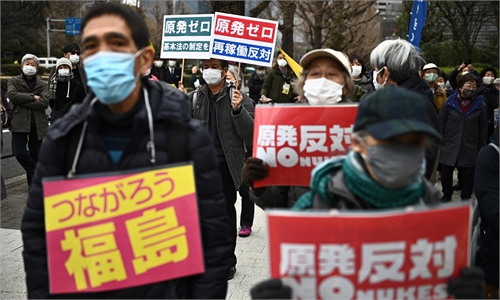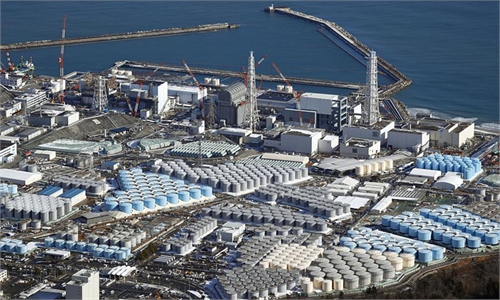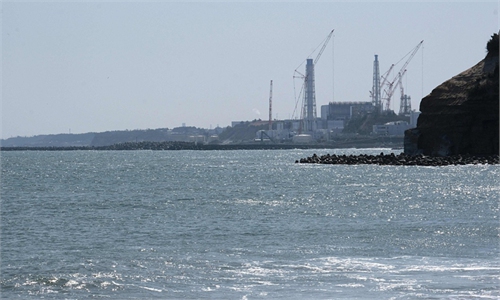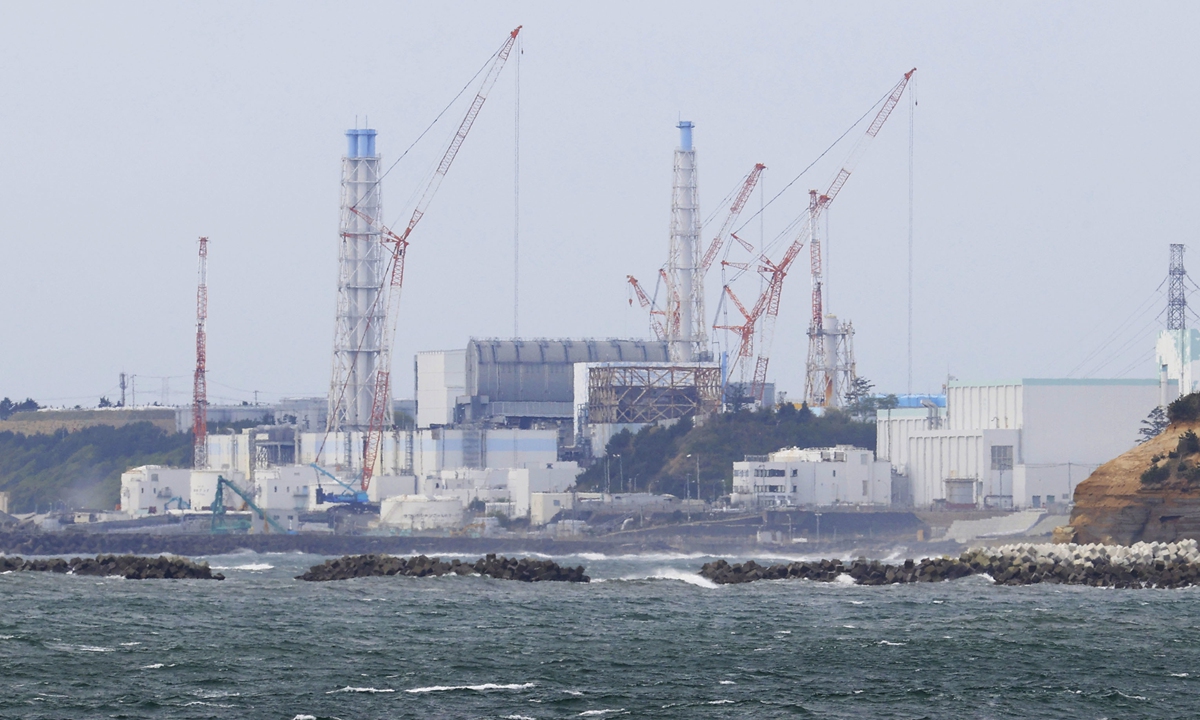
Photo taken from Namie in Fukushima Prefecture, northeastern Japan, on Tuesday shows the crippled Fukushima Daiichi nuclear power plant. Tokyo decided the same day to release radioactive water into the sea. Photo: VCG
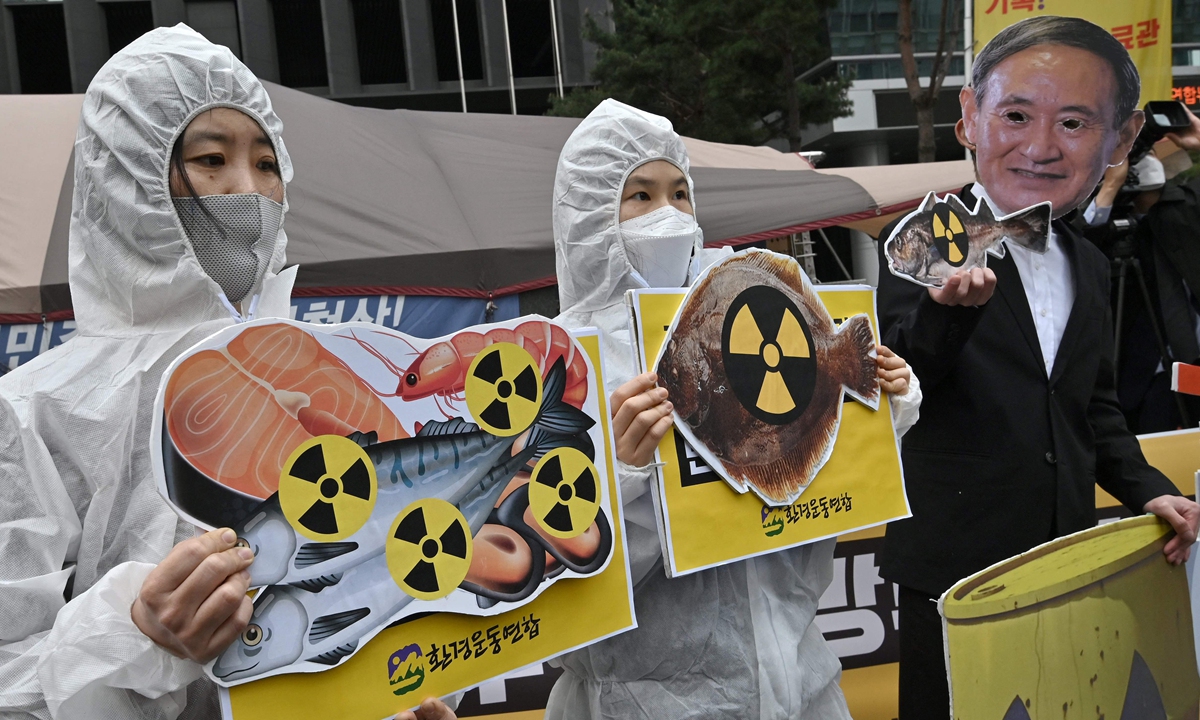
South Korean environmental activists wearing protective clothing and a mask (right) of Japan's Prime Minister Yoshihide Suga hold pictures of fish with radioactivity warning signs during a protest against Japan's decision on releasing Fukushima wastewater, near the Japanese embassy in Seoul on Tuesday. Photo: VCG
Although Japan is trying to convince the world that Fukushima radioactive water is safe to be dumped into the sea, and the US even thanked Japan's "transparent efforts," Asian countries including China and South Korea, as well as some civil groups in Japan and international organizations are still expressing their concerns and strong opposition, due to Japanese government's low credibility in handling the nuclear issue and the unpredictable ecological risks.
Japan on Tuesday approved a decision to discharge radioactive water from the disaster-stricken nuclear complex in Fukushima Prefecture into the ocean, which means Tokyo Electric Power Company (TEPCO) will be allowed to start discharges of contaminated water within two years.
Chinese experts said that Tokyo has made the irresponsible decision, for which it has received the endorsement of the US and because of it, faced very limited pressure from the West.
This case has proven that the so-called "rules-based international order" crowed by the US is actually a lie which only serves US strategic interests but ignores the concern of other countries, even US allies like South Korea, experts said.
China and other Asia-Pacific countries which will be immediately affected by the radioactive water release need to work together to make sure the release is under international supervision, and reserve the right to sue Japan according to relevant international laws once Tokyo's act causes damages and pollution, analysts noted.
Collapse of credibility
To prevent the nuclear leakage in 2011 caused by the earthquake from getting worse, TEPCO chose to inject seawater into the reactor cores to cool the reactors and the operator of the Fukushima nuclear power plant has stored 1.25 million tons of wastewater in tanks.
The contaminated water will likely fill up all the plant's available tanks by summer of 2022, TEPCO said, which prompts the Japanese government to approve the decision of dumping the treated water still containing radioactive substances into the ocean.
Prior to making the decision, reports said TEPCO had studied several versions of the nuclear wastewater treatment plan, such as building additional storage tanks and capacity, setting tanks elsewhere, going underground after solidification, dumping it into the sea after treatment, and evaporating it, but it ended up with this "cheapest plan" which the Japanese government described as the "best option" on Tuesday.
When TEPCO releases treated water, it is diluted more than 100-fold using seawater, ensuring contains fewer than 1,500 becquerels of tritium. That is one-fortieth of the national standard, Nikkei Asia reported.
But Greenpeace East Asia had revealed to the Global Times that the ALPS (Advanced Liquid Processing System) pumping and filtration system of TEPCO does not remove tritium or carbon 14, and also does not remove all of the other radioactive isotopes such as strontium-90, iodine 129, cobalt-16.
Analysts and environmental groups raised doubts over whether TEPCO can eventually clean up the Fukushima radioactive water before it discharges into the ocean. Is TEPCO and the Japanese government still trustworthy given its frequent stains and scandals in the past?
Since 1977, TEPCO has been accused of falsifying data and concealing safety risks in 199 periodic inspections of its 13 reactors at Fukushima Daiichi as well as Kashiwazaki-Kariwa nuclear plants.
Gui Liming, an expert on nuclear safety at Tsinghua University, told the Global Times on Tuesday that the claims of the Japanese government and TEPCO that the "decision is transparent" is unreliable and questionable given TEPCO's notorious record in handling the nuclear accident.
"Was the data TEPCO provided to the IAEA accurate?" Gui asked.
Citing the United Nations Convention on the Law of the Sea (UNCOLS) which prohibits the discharge of substances that pollute the marine environment and acts or activities that harm other countries and their environment, Gui criticized Japan for violating the law and would face a huge blow to its image in the international community.
Zhao Lijian, a Chinese Foreign Ministry spokesperson, said discharging radioactive wastewater from Fukushima nuclear power plant which recorded the highest level nuclear accident is completely different from releasing wastewater from normal operated power plants.
Japanese political news commentator Jiro Honzawa told the Global Times on Tuesday that he is "startled" to see the Japanese government eventually making the decision. "The Japanese government uses lies to cover up lies" and releases contaminated water containing radioactive substances into the sea where fish and shellfish live, which threatens the earth's ecology.
Honzawa said it is a matter of course for China, Russia and countries in the Asia-Pacific to raise objection to the decision.
Japan, as a victim of the 1945 nuclear bombing, should have understood the importance for human beings living together with the environment. But Japan would like to have human beings on Earth to pay the bill for the Fukushima disaster, Honzawa added.
For the Japanese, the Japanese critic said such decision is forcibly demanding Japan's own citizens to give up all seafood when people already have to avoid consuming vegetables and seafood from Fukushima and northeastern Japan. Honzawa said he feels baffled by the country's seemingly cursed fate.
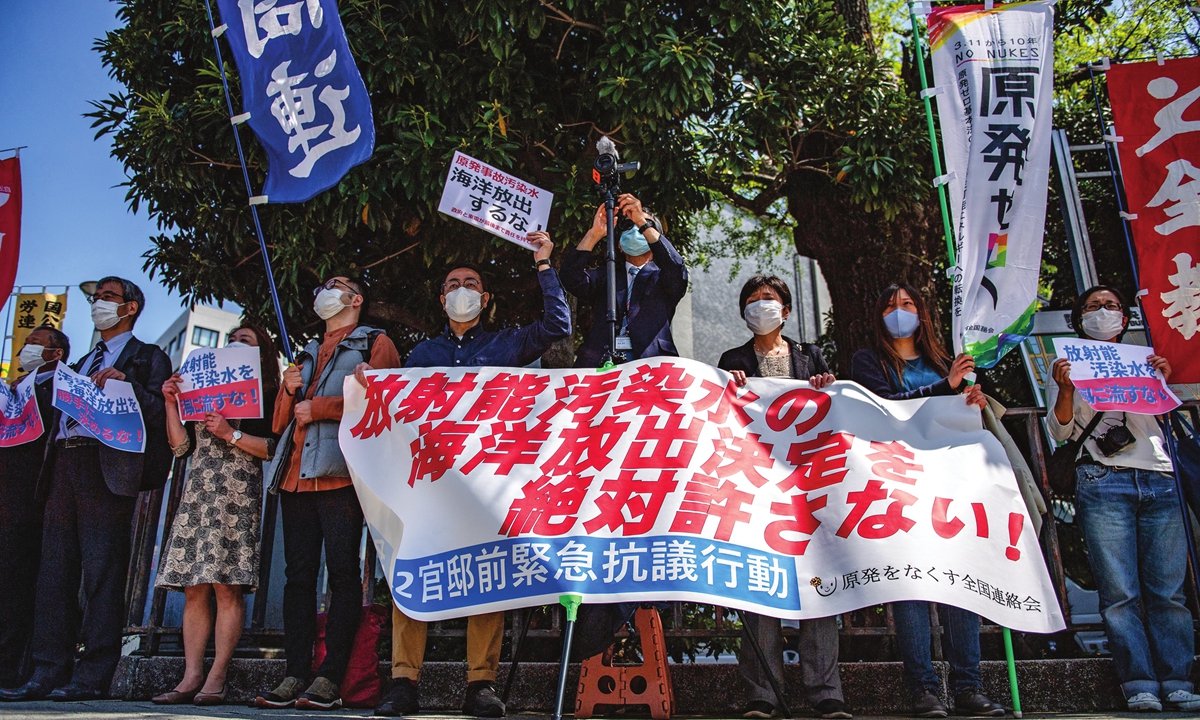
On Monday, activists take part in a protest outside the prime minister's office in Tokyo, Japan, against the Japanese government's plan to release treated water from the stricken Fukushima nuclear plant into the sea. Japan has decided to release treated water from the stricken Fukushima nuclear plant into the sea, reports said Friday, despite strong opposition from local fishermen. Photo: AFP
International inspection
Shortly after Japan announced the decision on Tuesday, both China and South Korea expressed grave concern. South Korean Second Vice Foreign Minister Choi Jong-moon on Tuesday summoned Japanese Ambassador Koichi Aiboshi and lodged a solemn protest to Japan over the controversial issue.
Choi is expected to demand that Japan be transparent and open about the treatment of water at the Fukushima nuclear plant and accept inspections, Yonhap News Agency reported.
Chinese Foreign Ministry spokesperson Zhao also said Tuesday that as a close neighbor of Japan and a stakeholder, China strongly urges Japan to re-examine its decision to dispose of the nuclear wastewater and refrain from starting the discharge before reaching agreements with all relevant countries and the International Atomic Energy Agency (IAEA) through full consultations.
Japan should shoulder its legal responsibilities under UNCLOS to inform and consult with countries that will be impacted by discharges of radioactive water into the Pacific Ocean, Shaun Burnie, senior nuclear specialist with Greenpeace East Asia, told the Global Times.
Because releasing the contaminated water is not just an internal issue of Japan but involves the international marine environment, Burnie said.
Chinese experts urged that an independent international scientific assessment should be carried out before deciding whether the wastewater can be dumped or not, calling on neighboring countries of Japan to join hands to file legal lawsuits against the Japanese government, pressing it to withdraw the decision or demand proper compensation.
The international investigation should request transparent and public data from the Japanese government and assess a variety of measures of the wastewater treatment and their potential risks and damages, Lin Boqiang, director of the China Center for Energy Economics Research at Xiamen University, noted.
When Japan begins to dump the wastewater, the IAEA should launch a long-term and strict monitoring system over the radioactive water and publish its specific data in a timely manner, Gui advised.
Exchange for endorsement
As a country with special influence over Tokyo, the US flagrantly supported and even thanked Japan's decision, that was widely slammed by the international community and Japanese.
US Secretary of State Antony Blinken tweeted on Tuesday that "We thank Japan for its transparent efforts in its decision to dispose of the treated water from the Fukushima Daiichi site."
Lü Xiang, an expert on US studies at the Chinese Academy of Social Sciences, said that Japan has received US endorsement and permission as it has convinced the US that Japan is a loyal ally, and based on such political stance, the US would tolerate Japan even if radioactive water will impact America's coast sooner or later.
US allies in the region like South Korea and some ASEAN countries believe the US is not a responsible power and its "rule-based international order" has failed to take care of the concerns of the region, Lü said, adding that China and other partners with similar concerns should cooperate to keep the pressure on Japan and safeguard their interests through legal means.
Japan dares to make a deal with the US on the nuclear matter which will impact the marine environment shared by the world, so Tokyo is unqualified to ask the international community for trust, and its "transparency" is not convincing, Chinese analysts said.



